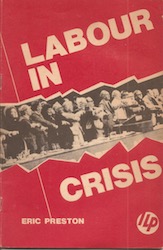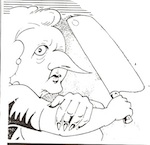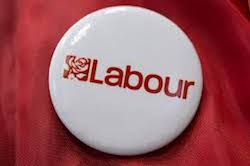When Eric Preston died on 20 September this year it not only brought to an end his long and active life in the struggle for socialism, but marked the passing of an era for the ILP too. Eric’s writing and thinking over more than 60 years of ILP membership was hugely influential, not only within the organisation but across the broad and varied terrain of the democratic left.
 His most important work was arguably Labour in Crisis, a booklet published by the ILP in 1982 in the wake of what seemed then to be a defining battle between left and right within the Labour Party.
His most important work was arguably Labour in Crisis, a booklet published by the ILP in 1982 in the wake of what seemed then to be a defining battle between left and right within the Labour Party.
Examining the record of both wings, it set out the ILP’s view of “a long haul strategy to root the ideas of socialism in the party, the wider movement and the working class”, as then ILP secretary Anne-Marie Graham wrote in her preface. In it, she says: “He makes the case for tolerance within the boundaries of a democratic constitutional framework in the Labour Party as the main hope for socialist advance.”
It’s a perspective that resonates to this day.
But Labour in Crisis was far from Eric’s only influential work and others followed over the next two decades on the socialist case for one member, one vote, a ‘hitch-hiker’s guide’ to the Labour Party, the rise of Blair and New Labour, and the Iraq War.
Ill health meant his contribution in later years was more limited but he was still writing and thinking right to the end. The article that follows is one of those later pieces, one written in 2012 but never entirely finished and, until now, never published.
In it, Eric grapples with the impact of the financial crash, the demise of New Labour and the rise of austerity under the Conservative-led coalition government of David Cameron.
He does so from the framework of the ILP’s democratic socialist traditions and “our essential humanitarian concerns”, holding fast to “the ethics and principles relating to care and compassion; fellowship and fraternity; mutuality and co-operation; social, political and economic equity, and democracy – all of which are interlinked and constitute the foundation of our politics”.
Although unpolished, it clearly illustrates Eric’s ever-present determination to tackle the current political situation from the core, to expose its ideological and historical roots, and to face every contradiction and obstacle to social progress head-on.
As ever, he relates his thoughts on the road ahead back to the ILP’s founding moral purpose while striving to convey his view of the world ‘as he sees it’ in a manner accessible to as wide a readership as possible.
This article is published in Eric’s memory. Although a bit dated in places, we hope you find it a stimulating and thought provoking read.
* * * * * * * * * * * * * * *
Welcome to the ILP: As I See It
By ERIC PRESTON
THE ILP started life as a political party in 1893. It was essentially a reaction to and outgrowth of harsh working conditions and widespread poverty. It was driven by humanitarian values and radical social purpose. And from the outset, it sought to promote solidarity, fellowship and co-operation in an attempt to challenge the mal-distribution of wealth and power and the associated human exploitation, which was not only confirmed on the factory floor and down the coal mines but throughout much of Britain.
 The ILP was a prime mover in the formation of the Labour Party in 1906 when its own leader, Keir Hardie, became leader of both organisations. It had a chequered career prior to its disaffiliation from the Labour Party in 1932, after which it declined as a parliamentary force and, in time, shrank in size and political effectiveness. It is now reconstituted as a political pressure group seeking to promote discussion and further political understanding.
The ILP was a prime mover in the formation of the Labour Party in 1906 when its own leader, Keir Hardie, became leader of both organisations. It had a chequered career prior to its disaffiliation from the Labour Party in 1932, after which it declined as a parliamentary force and, in time, shrank in size and political effectiveness. It is now reconstituted as a political pressure group seeking to promote discussion and further political understanding.
The perspective of the ILP has inevitably changed and developed as the world about us has changed and developed, but our essential humanitarian concerns have remained. We acknowledge the potential fallibility of all prognosis and proposition, but hold fast to the ethics and principles relating to care and compassion, fellowship and fraternity, mutuality and co-operation, social, political and economic equity and democracy – all of which are interlinked and constitute the foundation of our politics.
Clearly we are on the left of the political spectrum and expressly within the democratic socialist tradition of the ILP. However, our socialism is not to be defined in terms of some preconceived socio-economic system. We do not have a blueprint of the ideal political economy of the future, although it should be said that we reject both the command economy associated with central planning, and the under-regulated free market associated with neoclassical orthodoxy.
We are essentially democratic and readily acknowledge that democracy can only be established if people have the means to sustain themselves independent of the state. This implies a degree of economic independence, which, in turn, implies a market economy with some mix of private, corporate or co-operative enterprise.
That said, we must make our position quite clear. Although we are not opposed to the concept of a market economy, per se, and although we acknowledge the quality of life it has afforded many people throughout the ‘economically developed’ world, it remains for us highly problematic to say the least.
Indeed, it must be said that while we recognise the market is a precondition for democracy, we also recognise that it inevitably tends to produce inequalities, which in addition to fostering injustice, also distort and undermine democratic practice and democratic institutions.
When Adam Smith, the founding father of classical (market) economics, made clear in The Wealth of Nations that it is not from the benevolence of the butcher, brewer or baker that we expect our dinner, but from their regard for their own self-interest, he laid stress on the selfish motivation which is fundamental to all market economies. In doing so, he highlighted a paradox that has bedevilled all movements for social and economic justice and democracy throughout the lifetime of capitalism.
Of course, we are all aware that the self-interest of the local butcher and local baker are not really the problem. But the self-interest that is the primary motivation of those who own or control corporate wealth or manipulate international finance is entirely different. Indeed the globalisation and consolidation of financial markets, and the relatively recent growth of the financial sector, which is largely under-regulated, has undoubtedly eroded the economic authority of nation states and thereby fundamentally undermined the democratic process. And therein lies a paradox.
Furthermore, the essential driving force of corporate capitalism is a combination of profit motive and competitive environment, which together ensure that the highly successful and ambitious continually strive to increase profitability or face the prospect of decline. Needless to say, the overall consumption of resources that this stimulates is considerable and interminable, and, in the long run, unsustainable.
Meanwhile, whether we like it or not, the market intrudes into all our lives and institutions and becomes bound up with numerous issues. However, in this article we have chosen to focus only on what we think is essential to the understanding of our perspective.
The neo-liberal ideology
History and experience suggest that human beings are a compound of selfish and selfless predispositions and potential. Hence our greed, acquisitiveness and anti-social behaviour; hence our kindness and consideration and humanitarianism; hence the universally acknowledged need for family socialisation, for an ethical, cultural and humanitarian education system, and for an array of public institutions committed to nurturing the morals and values that are essential to society and social living.
 This is a social amalgam committed to fostering values that are clearly at odds with the precepts of the free market economy. As Jonathan Sacks said in The Politics of Hope: “There is an economic system and a moral one. The first belongs to the market, the second to the concentric circles of family, friends, community and society.”
This is a social amalgam committed to fostering values that are clearly at odds with the precepts of the free market economy. As Jonathan Sacks said in The Politics of Hope: “There is an economic system and a moral one. The first belongs to the market, the second to the concentric circles of family, friends, community and society.”
However, this is a view that would create consternation if it were to be accepted and adopted as part of the perspective of any of the major political parties. If it were publicly acknowledged by any parliamentary party, it would certainly not endear itself to the international finance community. Indeed, neo-liberalism, which embraces the idea of autonomous markets and facilitative states, actually celebrates the idea of a market democracy.
The concept of the free market economy has been around since the time of Adam Smith. It was stalled during the post-war years of Keynesian economics, but returned in radical guise during the the1980s, along with the US Republican presidency of Ronald Reagan (1981-’89) and the Conservative UK premiership of Margaret Thatcher (1979-’90).
The neo-liberal ideology that was established with this partnership provided the guidelines for both administrations during which a whole range of right-wing initiatives were developed within each country. However, as with all philosophical conceptualisation, neo-liberalism is not without ambiguity.
What can be said with reasonable certainty is that it embraces unbridled market capitalism (free trade and free markets with an emphasis on economic, civil and individual liberty). What is more, with the advent of the Reagan/Thatcher alliance came political backing for economic deregulation, which had originated in the USA.
Financial deregulation was entirely in keeping with the free market philosophy. It removed or relaxed controls on interest rates, relaxed restrictions on the type of business that could be transacted and on the types of company permitted to deal in various markets.
As a consequence, there was a significant increase in economic activity. With the development of high-tech communication systems came a massive growth in the number and strength of financial institutions. Neo-liberalism was triumphant and came to dominate the world during the closing decades of the 20th century.
However, deregulation brought unintended and undesirable consequences. As we now know, the globalisation and deregulation of multinational corporations and the exponential growth and global spread of the deregulated financial markets, has clearly eroded the economic authority of nation states.
It has not only undermined their capacity to defend currency values but has increasingly encouraged governments to modify the management of their financial affairs in light of, or in anticipation of, market response. In short, deregulation has become a national and international impediment and thereby a further constraint on democracy.
Thatcher was undismayed by this, however, and as always remained wholly absorbed in promoting her ‘enterprise culture’. She was essentially anti-egalitarian, undemocratic and class conscious; she encouraged the pursuit of personal gain; saw competitiveness as a virtue; and was convinced of the efficacy and implicit justice of the market and its inherent values.
She was especially hostile to organised labour and determinedly committed to weakening the trade union movement via trade union legislation and to destroying the miners’ union and the mining industry. She also neglected industry and in effect was responsible for serious de-industrialisation, particularly in the north east of England.
She cut public expenditure, capped the majority of welfare benefits and put an end to the automatic increase in state pensions in line with earnings. She abolished the Greater London Council and all the metropolitan county councils, reduced central funding and introduced rate capping and competitive tendering for local government. Indeed, she was hostile to all public utilities and public services and undertook an extensive programme of de-nationalisation and privatisation, and introduced the Private Finance Initiative (PFI).
Meanwhile, as the supply of consumer goods increased and the deregulated financial institutions made borrowing and credit card living easier, so shopping as a pastime evolved, savings decreased and debt grew.
New Labour & the market society
We recall the Thatcher period in some detail because it was a watershed and we need to remember what it entailed and how it changed things. It saw the corporate experiment dismantled, the market ethos promoted and the public services and public employees forced into a market mould and mind-set.
 Indeed, even a change of language was encouraged, started by Thatcher, and, sadly, continued under New Labour. As Edward Skidelsky noted in a 2010 Prospect Magazine article, ‘The hollowness of human capital’: “Over the past 50 years, economics and its jargon have penetrated every corner of human life… Doctors, priests and scientists are lumped together as service providers. Schoolteachers are urged to ‘add value’ to their pupils and the pig philosophy, as Thomas Carlyle called it, has become all-embracing. But, of the many harms inflicted by economics on the English language, ‘human capital’ is the most grievous.”
Indeed, even a change of language was encouraged, started by Thatcher, and, sadly, continued under New Labour. As Edward Skidelsky noted in a 2010 Prospect Magazine article, ‘The hollowness of human capital’: “Over the past 50 years, economics and its jargon have penetrated every corner of human life… Doctors, priests and scientists are lumped together as service providers. Schoolteachers are urged to ‘add value’ to their pupils and the pig philosophy, as Thomas Carlyle called it, has become all-embracing. But, of the many harms inflicted by economics on the English language, ‘human capital’ is the most grievous.”
This was, in fact, a determined effort to establish a ‘market society’. As David Marquand notes in ‘False Friend: The State and the Public Domain’, his contribution to Restating the State: “Behind all this lay two crucial assumptions, both antithetic to the very notion of the public domain and to the civic ideal of engagement and debate that lies at its heart. The first was that the public services could and should behave as though they were private firms. The second was that the central state had both the right and the duty to remodel civil society by fiat from the top.”
Sadly, New Labour followed in Thatcher’s footsteps. As Dexter Whitfield wrote in New Labour’s Attack on Public Services, New Labour created markets in public services on an unprecedented scale. Education, health and social care, children’s services, housing, planning and regeneration, the criminal justice system and the welfare state. These were all undergoing marketisation.
Of course, we can and should offer some suggestions as to why New Labour went the way it did. In fact, it was always a compromise with neo-liberalism and the New Labour government, almost inevitably, became enveloped in the global market economy with all that this entailed. Indeed, Gordon Brown ultimately ended up adding more financial deregulation to that of Thatcher. New Labour also used privatisation and PFI to relieve pressure on the public purse, allowing new schools and hospitals to be built.
But there is much more to tell and a full and adequate analysis of New Labour will take time. As of now, we should be getting down to an analysis of the Conservative/Liberal alliance, which may well turn out to have more in common with neo-liberalism than we care to think.
In any event, we are from here on going to be living with the aftermath of the financial crash. And that is going to hurt most the people who contributed least to the crisis. Furthermore, we are undoubtedly going to see a government that will use this period of economic uncertainty and difficulty to launch an attack on public services and advance privatisation.
Such a policy fits neatly with the disguised neo-liberalism of David Cameron and with the anti-statist philosophy of Liberalism. Cameron wants to appear to be empowering people when in reality he is merely giving them the right to choose who or which private company gets their local privatised contract. And the Liberal ideology, which puts individualism and individual freedom ahead of most things, leaves Nick Clegg free to do much as he wishes.
The Labour Party
Whatever the outcome, we know now that we need to renew our commitment to the Labour Party and encourage others to do the same, primarily on the understanding that we will be campaigning with others to encourage support for significant changes to the rules in a determination to re-enfranchise and re-involve the membership.
 We also want to see proportional representation in local and parliamentary elections. In no way do we accept the idea of election primaries, although we do recognise the need to find ways and means to politically involve and energise the general public.
We also want to see proportional representation in local and parliamentary elections. In no way do we accept the idea of election primaries, although we do recognise the need to find ways and means to politically involve and energise the general public.
Allied to such developments is the need to defend and enable political protest and demonstration without harassment and intimidation, while we have an obligation to marshal our own people to avoid provocation.
We undoubtedly live in very peculiar times with extremes of wealth and poverty evident throughout the world. Many people are experiencing oppression and many more are living on the edge of life. We are humanitarian and internationalist, and we are understandably angered by this and by our own impotence, but we are an insubstantial organisation and can do little more than demonstrate to raise awareness among the general public and encourage our parliamentarians to be more pro-active.
In addition, of course, there is one problem that needs maximum recognition, one that affects our own viability on the planet. It is in fact a complex of inter-related problems that together could bring about the ultimate disaster – global warming, environmental distress, depletion of biodiversity, ecosystem loss, population growth, and the finite capacity of the world.
Unfortunately, relatively few people and very few manufacturers want to own up to this problem, and there is an evident reluctance to pare back on the luxuries of life. As of now we can do little to alter the situation, but we can and should accept a responsibility to promote awareness of it.
Eric Preston, June 2012
—-
You can read David Connolly’s tribute to Eric Preston here.
The ILP still has copies of Labour in Crisis for sale, priced £7.00.
Email info@independentlabour.org.uk for details.


